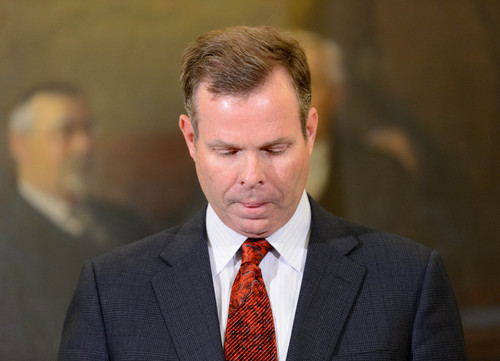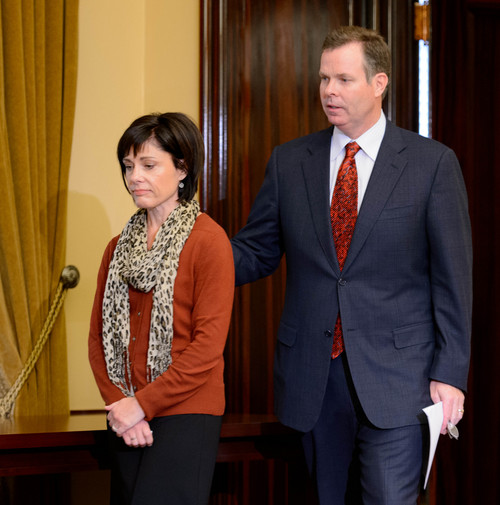This is an archived article that was published on sltrib.com in 2014, and information in the article may be outdated. It is provided only for personal research purposes and may not be reprinted.
A Holladay couple who staged a 2012 fundraiser for John Swallow have amended the report of how much they spent on the event, declaring that the reception for the then-attorney-general candidate cost them $28,000, not the $1,000 the campaign asked them to list.
The new filing came the same day that two new search warrants in the investigation of Swallow and his predecessor, Mark Shurtleff, were released, bringing to 10 the number of warrants executed thus far.
Mark Thomas, Utah's director of elections, said that, based on the findings of a Utah House committee that revealed that the cost of the fundraiser had been significantly underreported, the lieutenant governor's office sent a letter to Tim and Jennifer Bell asking them to fix the reported cost or their case would be turned over for possible criminal charges.
The Bells made that change Tuesday, according to their attorney, Abe Bates. The next step, Thomas said, will be to ask the Swallow campaign to explain why it asked the Bells to report a smaller amount.
The Bells held the August 2012 fundraiser for Swallow, then the Republican nominee for attorney general, at their Holladay home, which at the time was ground zero in a major lawsuit against Bank of America.
The couple were suing the banking giant for unlawfully foreclosing on their $3 million residence. Utah had joined the lawsuit, hoping to help thousands of Utahns facing foreclosure by the bank.
But the Bells had another reason to stage the event: They wanted to thank Swallow and the attorney general's office for locking up Marc Sessions Jenson, who had swayed the couple to invest $500,000 in a now-defunct plan to build a $3.5 billion golf and ski resort near Beaver.
Search warrants released last week revealed the Bells' motivation for holding the Swallow fundraiser. Bates confirmed that the Bells had spent more than a year trying to get the attorney general's office to charge Jenson in the Mount Holly scheme.
He said the office stonewalled the Bells for a year and eventually warned Tim Bell that he was a target of the investigation because he had introduced two other investors to Jenson. The office later told Bell he wasn't a target and in August 2011 filed fraud charges against Jenson.
The catered event with a string quartet cost more than $28,000, according to invoices provided to House investigators. The price tag initially was pegged at $15,000, Bates said, because half was considered an expense for Bell's company, since many guests were business acquaintances.
The Swallow campaign contacted Bell in January 2013, days after the scandal erupted, and asked Bell to report that the fundraiser cost $1,000. Bell did.
Bates said the fundraiser wasn't related to the Bells' role in the Bank of America case. The couple sued the bank for violating Utah's foreclosure law. The state later joined on behalf of 18,000 Utahns facing foreclosure — 5,000 who had been foreclosed upon and 13,000 who had received notices from the bank.
The couple settled their case as the bank basically forgave $1 million on their home's cost and slashed their interest rate.
Just before he left as attorney general, Shurtleff dismissed the state's wider case — against the wishes of the attorneys in his office handling it, even crossing out the names of those lawyers and writing his above them.
Shurtleff wrote an email to one of those attorneys stating that the case had become a problem for Swallow because of the Bell fundraiser and Bell's role in the Jenson case.
Bates said the Bells' settlement was unrelated to the state's involvement and would have gone through regardless of the attorney general's actions. But Bates said Shurtleff had an obligation to Utahns facing foreclosure to see the matter through.
"I don't want people to be left with the impression," Bates said, "that Tim and Jennifer throwing the fundraiser caused 13,000 folks facing foreclosure in the state to have their interests harmed when Shurtleff unilaterally dismissed the lawsuits."
In the newly released warrants, investigators sought and received permission from a judge to search eight computers, seven phones and numerous other data devices seized when they arrested Tim Lawson, a friend and confidant of Shurtleff.
Investigators also recovered photographs of Shurtleff and Lawson as well as documents related to plea negotiations involving Jenson.
Jenson had paid Lawson $120,000, according to court records, because he was told Lawson could use his influence with Shurtleff to smooth over Jenson's legal tussles.
Lawson was arrested Dec. 12 and charged with six felonies as part of a broad investigation into alleged misconduct by Shurtleff and Swallow.
Third District Judge Vernice Trease signed the warrants Dec. 17, letting investigators search the computers and data devices they seized when Lawson was arrested at his Provo home.
Another warrant demands that a cellphone provider turn over records of former Chief Deputy Attorney General Kirk Torgensen, who was reassigned this week by new Attorney General Sean Reyes.
Twitter: @RobertGehrke —
A new legal issue
Former Attorney General John Swallow has apparently opened a private practice. Swallow filed paperwork Monday with the Utah Department of Commerce creating the Swallow Law Office, with the address for the business listed as his Sandy home.
But it appears that in setting up his legal practice, Swallow is in murky area.
The law practice is owned by Swallow & Associates, a company he and his wife, Suzanne, established in 1998 and has been the umbrella for several of their business interests. Utah's Rules of Professional Conduct prohibit a nonlawyer from holding any interest in a for-profit law firm. Suzanne Swallow is not an attorney.
Swallow was admitted to the Utah State Bar in 1990. The bar recently dismissed the second of two known complaints of ethical misconduct filed against him. Swallow, still the subject of an ongoing criminal probe, stepped down as attorney general Dec. 3, citing the financial and personal strain of ongoing investigations.
Robert Gehrke





